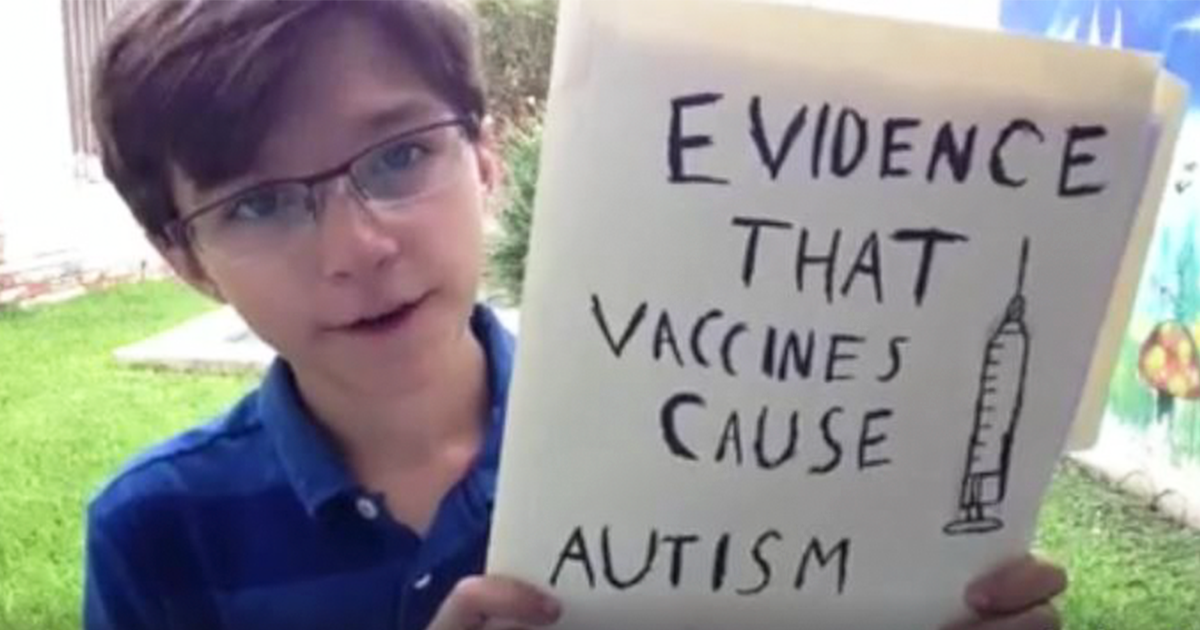HHS Investigation Into Debunked Autism-Vaccine Connection Sparks Outrage

Table of Contents
The Scientific Consensus: Vaccines Do Not Cause Autism
The scientific community overwhelmingly agrees: there is no causal link between vaccines and autism. Decades of rigorous research, involving countless studies and millions of participants, have consistently failed to find any evidence supporting this claim. The original study that sparked this controversy, published by Andrew Wakefield in 1998, was ultimately retracted due to fraudulent methodology and conflicts of interest. This fraudulent study remains the foundation of the anti-vaccine movement's claims, despite its complete discrediting.
The development and approval of vaccines involve rigorous testing and safety protocols. Multiple independent review boards, including those at the CDC and WHO, consistently confirm the safety and efficacy of vaccines. These organizations have repeatedly stated that vaccines are safe and essential for public health.
- Numerous large-scale studies have found no causal relationship between vaccines and autism.
- The original study linking the MMR vaccine to autism has been fully retracted and its author has been struck off the medical register.
- The CDC and WHO have repeatedly stated vaccines are safe and effective, and crucial for preventing serious diseases.
- Independent review boards, such as the Institute of Medicine, consistently confirm vaccine safety.
Understanding Public Distrust and the Spread of Misinformation
Despite the overwhelming scientific evidence, a significant portion of the public remains skeptical about vaccine safety. This distrust stems from various factors, including a lack of understanding of scientific processes, the influence of anti-vaccine advocacy groups, and the pervasive spread of misinformation on social media platforms. Celebrity endorsements and anecdotal evidence, while emotionally compelling, often lack scientific rigor and can significantly impact public opinion.
The ease with which false information spreads online, particularly through social media algorithms that prioritize engagement over accuracy, contributes significantly to vaccine hesitancy. Misinformation campaigns actively target vulnerable populations, exploiting anxieties and distrust in institutions. Combating this requires a multi-pronged approach focusing on media literacy and the promotion of reliable information sources.
- Lack of understanding of complex scientific processes and clinical trial methodologies.
- Influence of well-funded and organized anti-vaccine advocacy groups who actively spread misinformation.
- Rapid dissemination of false information through social media platforms and echo chambers.
- Mistrust of government agencies, pharmaceutical companies, and mainstream media.
The Potential Consequences of the HHS Investigation and Renewed Debate
The HHS investigation, and the renewed public debate surrounding the autism-vaccine link, carries significant potential consequences. Increased vaccine hesitancy directly leads to lower vaccination rates, increasing the risk of outbreaks of preventable diseases such as measles, mumps, and whooping cough. These outbreaks place a considerable strain on healthcare systems and can have severe, even fatal, consequences for vulnerable populations. The economic burden of treating outbreaks, including lost productivity and healthcare costs, is substantial.
- Decreased vaccination rates lead to significantly higher infection rates of preventable diseases.
- Outbreaks of measles, mumps, rubella, pertussis, and other preventable diseases put immense strain on healthcare systems.
- Increased healthcare costs associated with treating vaccine-preventable illnesses.
- Potential for long-term health consequences for individuals and communities, including permanent disabilities and death.
The Role of the HHS in Addressing Vaccine Hesitancy
The HHS plays a crucial role in addressing vaccine hesitancy and promoting vaccine uptake. Transparent communication, engaging directly with the public's concerns, and actively combating misinformation are essential. This requires a comprehensive strategy that includes:
- Increased funding for vaccine safety research to further solidify the scientific consensus and address any remaining uncertainties.
- Public health campaigns that focus on building trust, addressing misconceptions, and promoting vaccine safety using clear, evidence-based messaging.
- Collaboration with community leaders, healthcare providers, and trusted figures to disseminate accurate information and build community engagement.
- Stronger regulations and enforcement against the spread of demonstrably false and harmful misinformation online.
Addressing the Outrage and Moving Forward on Vaccine Safety
The HHS investigation into the debunked autism-vaccine link has understandably sparked outrage, fueled by misinformation and distrust. However, the scientific consensus remains clear: vaccines do not cause autism. Public health relies on evidence-based decision-making, and continued efforts to counter misinformation are essential. We must emphasize the critical role of vaccines in protecting individuals and communities from serious diseases.
We urge readers to actively seek reliable information from reputable sources such as the CDC and WHO regarding the HHS vaccine investigation and the debunked autism-vaccine connection. Counter misinformation when you see it, and advocate for evidence-based vaccine policies. The health and safety of our communities depend on it.

Featured Posts
-
 Bundestag Elections And Their Ripple Effect On The Dax Index
Apr 27, 2025
Bundestag Elections And Their Ripple Effect On The Dax Index
Apr 27, 2025 -
 Bencic Una Campeona Nueve Meses Despues De Ser Madre
Apr 27, 2025
Bencic Una Campeona Nueve Meses Despues De Ser Madre
Apr 27, 2025 -
 Wta Action Finalists Decided In Austria And Singapore
Apr 27, 2025
Wta Action Finalists Decided In Austria And Singapore
Apr 27, 2025 -
 Thueringen Amphibien Und Reptilienatlas Ein Umfassender Ueberblick
Apr 27, 2025
Thueringen Amphibien Und Reptilienatlas Ein Umfassender Ueberblick
Apr 27, 2025 -
 Monte Carlo Masters 2025 Djokovics Straight Sets Loss To Tabilo
Apr 27, 2025
Monte Carlo Masters 2025 Djokovics Straight Sets Loss To Tabilo
Apr 27, 2025
